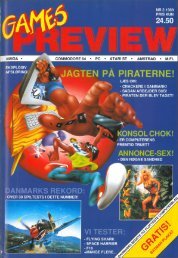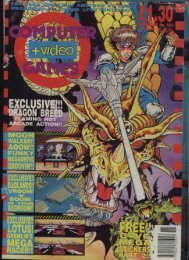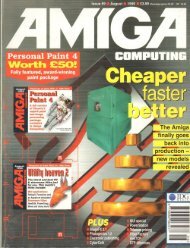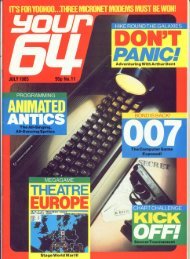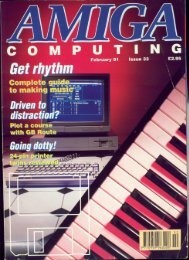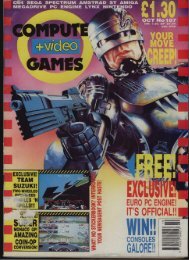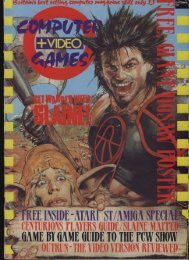Amiga Computing - Commodore Is Awesome
Amiga Computing - Commodore Is Awesome
Amiga Computing - Commodore Is Awesome
Create successful ePaper yourself
Turn your PDF publications into a flip-book with our unique Google optimized e-Paper software.
What processes do you have to undertake<br />
to develop a game? Do you start off with a<br />
definite idea of what you want to create,<br />
or does it just grow and develop as the<br />
project progresses? If possible could you<br />
explain to us the step by step process<br />
involved in developing a game?<br />
What I am aiming for. In order to change<br />
the bare idea into code I normally follow the<br />
steps below. This is not exactly the way I have<br />
gone about designing Explorer 2260 because<br />
of the type of game it is. Some other pro<br />
grammers almost certainly will not agree with<br />
the way I work, but the development process<br />
is a personal thing, built up from experience -<br />
what suits me may not suit anyone else! This<br />
is not a quick-start guide to programming;<br />
writing good programs requires years of expe<br />
rience and practice, as well as an in-depth<br />
knowledge of the <strong>Amiga</strong> and the language<br />
you are using.<br />
I. OK, you have a rough idea of what you're<br />
after. Firstly you must sit down and work out<br />
an outline, on paper, of what you want, filling<br />
in details as you go along. Expect this<br />
list to change! Explorer 2260 has<br />
changed beyond recognition<br />
from the early designs.<br />
II. Looking at this huge list<br />
of things you want to do,<br />
the first thing that will<br />
come into you head is<br />
"How the hell do I do<br />
this and where do I<br />
start?" I have found that<br />
there isn't any easy way to<br />
decide where to start. I<br />
tend to code the most com<br />
plex parts first as they are usu<br />
ally the pieces which other areas of<br />
the game rely on.<br />
III. To decide what to do, firstly take the list<br />
and develop what I call a data flow/ depen<br />
dency diagram. Look through your list for the<br />
sections which will be most used and most<br />
important. Put these down on paper and con<br />
nect them up with arrows showing the flow<br />
of data and interactions between them. Now<br />
add in the smaller, less important, sections<br />
and link them in. This way you can get some<br />
idea of which parts of the code will be<br />
depended upon by the rest of the program.<br />
These are the pieces you should code first. Be<br />
warned though, the process of drawing these<br />
diagrams and deciding upon which pieces are<br />
important take a lot of practice, choosing the<br />
wrong sections can make the program very<br />
difficult to write.<br />
IV. Now you start designing and writing sec<br />
tions of code. Don't try and get them to work<br />
together yet and don't try for optimal solu<br />
tions. As you get your teeth into the program<br />
-<br />
Ever fancied writing your own<br />
games? Hugh Poynton talks to young<br />
hopeful Chris Page in part two of his<br />
exploration of the pleasures and<br />
pitfalls of developing a game<br />
you will start to find easier ways to do<br />
things and better ways to go about certain<br />
tasks. You may also find pieces you have<br />
forgotten or didn't realise you needed, earli<br />
er in the design process. If you do find any,<br />
stop and re-evaluate your designs - you<br />
may have made a mistake in the design or<br />
you may have found a way around many of<br />
your problems. Do not be too concerned<br />
with graphics and sound at this stage, it<br />
does cut down design time if you get them<br />
sorted out here, but it may cause problems<br />
if you have to redesign parts of the pro<br />
gram in the next stage.<br />
V. Start bringing the pieces of<br />
code together and begin<br />
simple optimisations (a<br />
discussion of optimisa<br />
tion techniques is<br />
beyond the scope of<br />
this answer). Redesign<br />
and remake any pieces<br />
of code which cause<br />
problems - interfering<br />
with data structures etc.<br />
VI. You need to ensure<br />
everything works together<br />
correctly, then you can begin<br />
polishing and debugging. This<br />
takes a long time because it is often<br />
necessary to remake sections of code or, in<br />
extreme cases, start all over again!<br />
VII. Get someone else to test it! Never trust .<br />
a test you do yourself. I have been satisfied<br />
my code is bug free only to find my broth<br />
ers can pick holes in it! A good programmer<br />
is not necessarily a good debugger, espe<br />
cially when it comes to his own code.<br />
Expect to go back to stage V or even IV<br />
many times.<br />
VIII. Once confident your program is work<br />
ing you can remove bits and pieces, add<br />
time limits etc., for public release demos.<br />
Take notice of any feedback you get (I've<br />
already had a lot and I haven't even<br />
released anything). If people express dissat<br />
isfaction with parts then change them, if<br />
people want you to add things, try to.<br />
IX. Now the nasty part begins. You have a<br />
choice: Release the game as PD/<br />
Licenseware or start hounding software<br />
AMIGA ACTION FEATURE<br />
houses to try and get your game released com<br />
mercially.<br />
NOTE: Expect your designs to change at any<br />
time during the development process and do<br />
not expect to get a welt polished game<br />
designed, written and released in a few weeks<br />
or even a few months.<br />
How long has the game been in develop<br />
ment? When do you think it might be fin<br />
ished and do you see the copyright issue<br />
being a major problem?<br />
Explorer 2260 has been in develop<br />
ment, on and off and in many forms, for<br />
nearly six months. It is just coming out of<br />
the design phase into unoptimised code<br />
(stage IV) and I really can't say when it<br />
will be released. I am a student and<br />
university work takes precedence,<br />
but I am putting every spare<br />
minute into the game. I think 1<br />
may have worked around<br />
many of the areas which<br />
could have caused copy<br />
right problems but<br />
would still like to contact<br />
someone in Warner Bros<br />
to make sure.<br />
How do you plan to publicise the game<br />
when finished? Via the Aminet? By post<br />
ing downloadable demo's on the<br />
Internet?<br />
I intend placing demos on Aminet<br />
and on any other sites which may<br />
help (I already have had some<br />
offers). 1 may also contact a soft<br />
ware house - I have already<br />
thought of two which may be<br />
willing to help, with a view<br />
to commercial release,<br />
although this is remote,<br />
maybe. -<br />
Chris Page has recently been approached by<br />
a major <strong>Amiga</strong> software company and is in<br />
negotiations to have Explorer 2260 published<br />
and distributed. Good luck Chris.<br />
■




